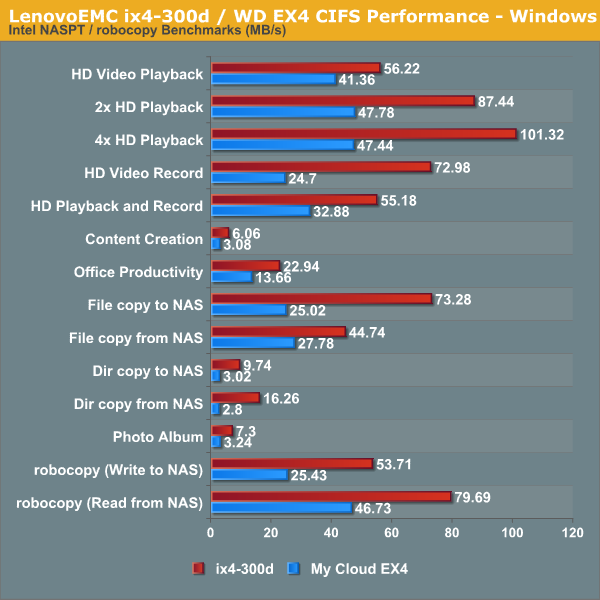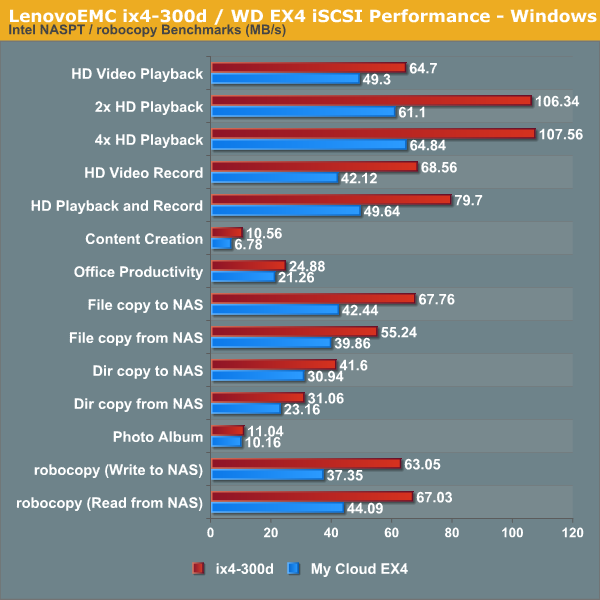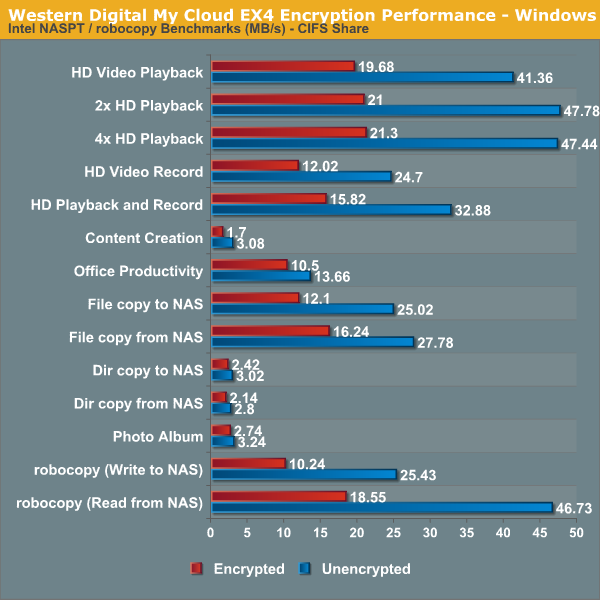Western Digital My Cloud EX4 and LenovoEMC ix4-300d Home NAS Units Review
by Ganesh T S on February 26, 2014 2:30 AM EST- Posted in
- NAS
- Western Digital
- LenovoEMC
Single Client Performance - CIFS and iSCSI on Windows
The single client CIFS performance of the LenovoEMC ix4-300d and WD EX4 were evaluated on the Windows platforms using Intel NASPT and our standard robocopy benchmark. This was run from one of the virtual machines in our NAS testbed. All data for the robocopy benchmark on the client side was put in a RAM disk (created using OSFMount) to ensure that the client's storage system shortcomings wouldn't affect the benchmark results. It must be noted that all the shares / iSCSI LUNs are created in a RAID-5 volume.

We created a 250 GB iSCSI target and mapped it on the Windows VM. The same benchmarks were run and the results are presented below.

Encryption Support Evaluation
Consumers looking for encryption capabilities can opt to encrypt a iSCSI share with TrueCrypt or some in-built encryption mechanism in the client OS. However, if requirements dictate that the data must be shared across multiple users / computers, relying on encryption in the NAS is the best way to move forward. Most NAS vendors use the industry-standard 256-bit AES encryption algorithm. One approach is to encrypt only a particular shared folder while the other approach is to encrypt the full volume. In our case, only the WD EX4 supports encryption, and only on a full-volume basis.
On the hardware side, encryption support can be in the form of specialized hardware blocks in the SoC (common in ARM / PowerPC based NAS units). In x86-based systems, accelerated encryption support is dependent on whether the AES-NI instruction is available on the host CPU (not considering units based on the Intel Berryville platform). The Kirkwood SoC used in the EX4 does have a security engine, so we the performance impact should not be brutal. We enabled encryption on a a CIFS share to repeat our Intel NASPT / robocopy benchmarks. The results are presented in the graph below (with the unencrypted folder numbers for comparison purposes).

The performance of the EX4 for normal volumes was barely acceptable. Unfortunately, enabling encryption only pulls down the numbers further, most times by more than 50%. We strongly urge users looking for good encryption support to look beyond the WD EX4 and LenovoEMC ix4-300d.










38 Comments
View All Comments
OoKiE69 - Wednesday, February 26, 2014 - link
Having owned a LenovoEMC ix4-300d for two months before returning it, I am surprised to see that your review does not mention the intermittent slow downs experienced. Or flagging perfectly good disks as failed. Or the random dropping of all your data on a RAID 10 configuration. This really annoying considering it takes over a day to establish the raid 10 on 4 x 3TB drives. None of these faults even generate a single email alert. Yes the email alerting was configured and tested.Despite claiming Full Windows 8 compatibility, it's not. None of the shares can be added to a library without a bit of fudging under the hood. Even with the fudging done it doesn't work with any of the Modern UI applications.
Fortunately a HP Micro Server and a license for Home Server 2011 all for just a little bit more money seems function with the same hard drives in RAID 10 without a single issue and fast. In short I found LenovoEMC ix4-300d NAS to be just really bad.
ganeshts - Wednesday, February 26, 2014 - link
What was the firmware version you used before sending back the unit ? I had lots of trouble with 3.x and even the first 4.x version (documented with links tot he support forums in the article under the ix4-300d: Springing Surprises sub-section). However, with the November firmware release, things have improved quite a bit. Still not trusting the NAS with any essential data, though.crazysurfanz - Wednesday, February 26, 2014 - link
Quote: Still not trusting the NAS with any essential data, though.Really isn't much more that needs to be said about it then is there.
Bob Todd - Thursday, February 27, 2014 - link
If you don't mind rolling your own and want a small footprint, those almost-always-on-sale at Newegg HP micro servers and something like WHS are indeed a very good option (with RAID or even something like DriveBender/SnapRAID).blaktron - Wednesday, February 26, 2014 - link
Hey, great article. I wonder, on either of these units can you configure the NICs independently? Do they have VLAN support?I have a storage VLAN and prod VLAN at home, and without the ability to attach one NIC to each VLAN for separate purposes then I'm still locked out of the home NAS market :(
ganeshts - Wednesday, February 26, 2014 - link
Not sure what extent of VLAN support you want, but if you want the NICs to be in separate subnets - yes, that is possible.muratai - Wednesday, February 26, 2014 - link
Can anybody explain me why 2ghz cpu WD nas performs far worse than Synology DS413J with same model but 1.6 ghz cpu?ganeshts - Thursday, February 27, 2014 - link
As I explained in the teardown and component analysis, there is a bottleneck in the way the drives are connected to the SoC. Out of two PCIe lanes, one is dedicated to the USB 3.0 to PCIe bridge (Etron EJ168A) leaving only one PCIe lane for the 4x SATA to PCIe bridge (the only link through which the four drives can talk to the SoC). Ideally, a 4x SATA should be connected through four PCIe 2.0 lanes for good performance.I can't comment / analyze the performance of the 413J unless I take a look at the components on the board.
Uwanna - Thursday, February 27, 2014 - link
So, I still do not understand why I would choose a NAS that has a proprietary SATA controller and software over an Intel ICHR 5- 24. If these units fail which you review there are no alternatives offered to replace these units with anything which can replace the reviewed units.If I at least "build my own" BYO, then I at least have the option to upgrade the entire BYO NAS with the equivalent Intel ICHR chipset or a more current offering.
ganeshts - Thursday, February 27, 2014 - link
Neither of these units use hardware RAID.If the unit fails, take the drives out, image them and access the data using a Linux system or, if on Windows, something like UFS Explorer. [ Check the last paragraph / gallery here: http://www.anandtech.com/show/4510/lg-n2a2-nas-rev... ]